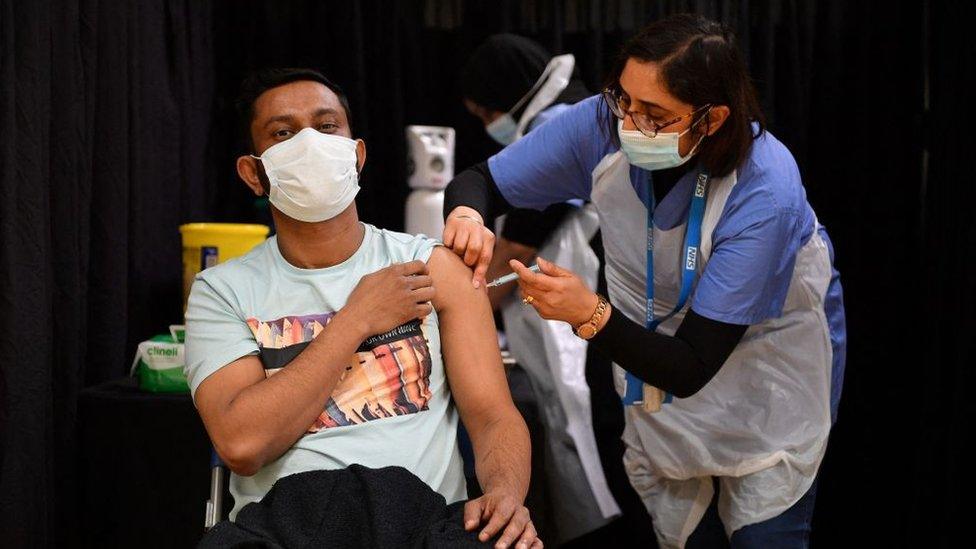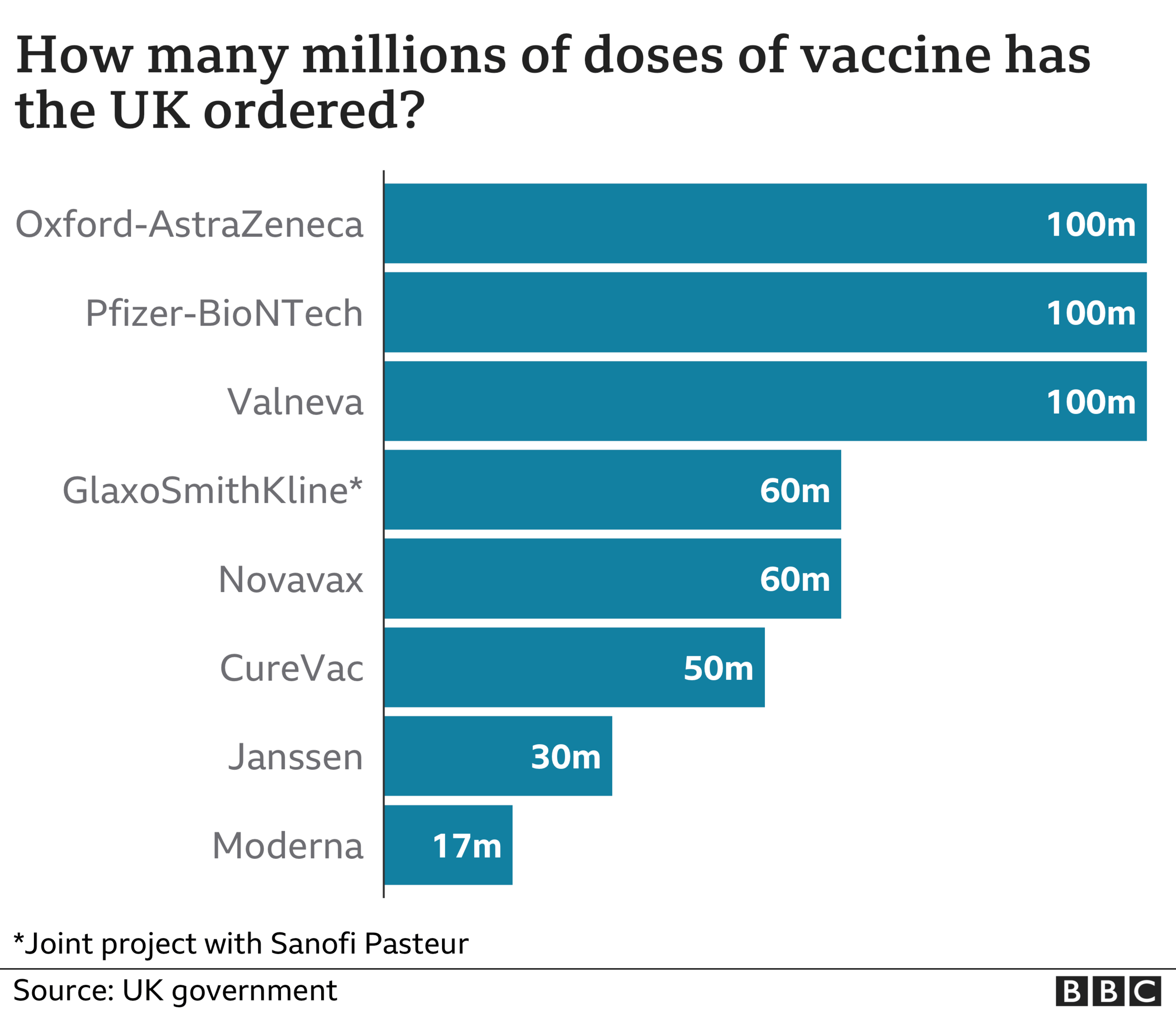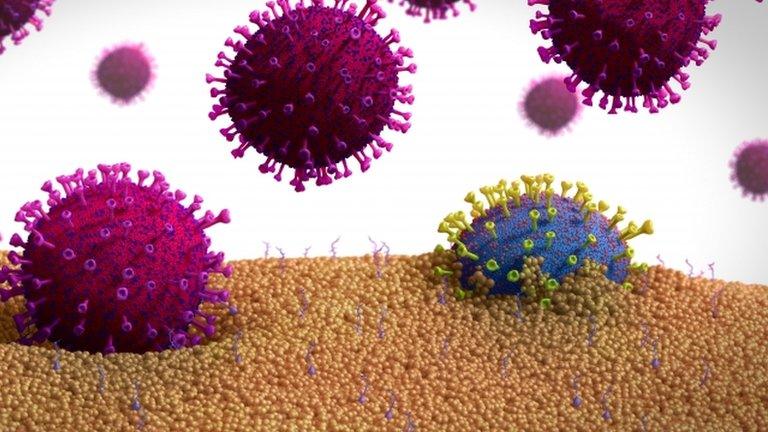Covid: Extra cash to target new variants will future-proof UK - minister
- Published
- comments

Extra funding to fast-track new vaccines will help "future-proof" the UK against new coronavirus variants, the vaccines minister has said.
Existing vaccines protect against variants such as the one found in Kent, but experts say the UK needs to be prepared as the virus keeps mutating.
Nadhim Zahawi said the £29.3m funding increase would boost testing facilities at Porton Down research laboratory.
Separately, he said booster jabs would be ready to deploy from September.
Asked about reports in the Times, external that third jabs would be given to over-50s and those with underlying health conditions in the autumn, the vaccines minister said no decision had been made yet.
Mr Zahawi told BBC Breakfast the booster programme could begin in September "or later in the year, or early next year".
He said clinicians would consider how well the protection from vaccines had lasted when deciding when to begin rolling out the programme.
Clinical trials will also be looking at the evidence on mixing different vaccines to see what will offer the most protection.
The vaccines minister also confirmed there would be an update from the Transport Secretary Grant Shapps later this week about England restarting international travel.
Meanwhile, the government said its extra funding - on top of £19.7m already promised - would also aid vaccine manufacture and allow scientists to accelerate the pace and scale of their work.
The cash will allow scientists to test 3,000 blood samples a week, up from 700 at the moment, to measure the levels of protective antibodies against Covid-19 generated by different vaccines.


Whether or not at-risk adults are offered a booster dose this autumn will depend on two key factors: whether immunity from the first two doses has waned so older adults are vulnerable to an autumn wave of infection; and whether a variant emerges which means the current vaccines can't prevent serious Covid disease.
Until we know the answers, it would be wrong to assume a third booster dose is on the cards. But of course it is being planned for.
All vaccine manufacturers are working on tweaked vaccines, which will aim to deal with so-called escape variants.
And a key UK trial - which will offer people a third dose of a different vaccine to the one they initially received - is not yet under way.
In January 2020, scientists across the world began work on vaccines against the novel coronavirus, long before the disease it caused even had a name. Had they waited until it was clear a vaccine was needed, the delay would have cost tens of millions of lives.

'Build back'
The government is already making plans for a booster Covid-vaccine programme in the autumn, to protect the most vulnerable ahead of winter.
Last week it ordered an extra 60 million doses of the Pfizer-BioNTech vaccine, which it said would be used alongside other vaccines for the boosters.
And it may use new, updated vaccines that are a better match for emerging variants.
But the World Health Organization's special envoy on Covid, David Nabarro, said the global vaccine rollout should be prioritised over booster jabs in the UK.
Speaking to Radio 4's the World At One, he said: "What you do with a scarce preventive action like a vaccine is that you give it to the people who need it the most. You have to look at the issue as a world issue.
"Top ups and other extra things and extra protection for people in the wealthy countries that should come a bit later," he said.


Following the funding announcement, Health Secretary Matt Hancock said: "We are committed to supporting the UK's flourishing life-sciences industry - and this announcement is yet another critical way we will build back better to protect the country over the coming months and years."
UK Health Security Agency chief executive Dr Jenny Harries said: "A new variant that can escape the current vaccines is the greatest risk of a third wave.
"This new investment will help us stay one step ahead of the virus by doubling our capacity to test vaccine effectiveness against emerging variants.
"While we expect the existing vaccines to offer protection against new variants, particularly preventing serious illness and death, it is important that we continue to monitor the picture as it develops."
The government has already announced a deal with biopharmaceutical company CureVac to develop vaccines against future variants, with 50 million doses pre-ordered.
Why do new variants of Covid-19 keep appearing? BBC's health reporter Laura Foster explains
Prof Neil Ferguson, an expert on the spread of infectious diseases who sits on the government's New and Emerging Respiratory Virus Threats Advisory Group (Nervtag), said new variants emerging posed the biggest risk to the UK's progress in the pandemic.
"In the worst case scenario, if we have a new variant pop up which does manage to evade the vaccines, say late summer or early autumn, there may be a need to roll back on some of these measures (being eased) at least temporarily until we can boost people's immunity," he told the BBC.
"Do I think it's likely to happen? No, I don't. I think we are much more likely to be on a steady course now out of this pandemic, at least in this country."
Prof Ferguson said variants would need to be monitored "carefully", but the UK had gone from a "terrible situation" in January to a "remarkably good situation now".
Covid restrictions are expected to be further eased on 17 May in England, Scotland and Wales, subject to government approval. In Northern Ireland, more restrictions may be lifted on 24 May.

OXFORD JAB: What is the Oxford-AstraZeneca vaccine?
EPIDEMIC v PANDEMIC: What's the difference?
VACCINE: When will I get the jab?
NEW VARIANTS: How worried should we be?
COVID IMMUNITY: Can you catch it twice?

On Tuesday, the UK reported another 1,946 daily infections, as well as a further four deaths within 28 days of a positive test.
The recorded number of deaths is often lower after weekends and bank holidays due to reporting lags.
The government's latest data, external showed more than 50 million Covid vaccinations have been given in the UK so far, with 34.7 million first doses and 15.6 million second doses administered.

THE PURSUIT OF LOVE: Longing for love and obsessed with sex, can Linda find the perfect lover?
THE BATTLE FOR BRITNEY: Trying to uncover the truth behind her controversial conservatorship

- Published26 November 2021

- Published1 July 2022

- Published2 April
